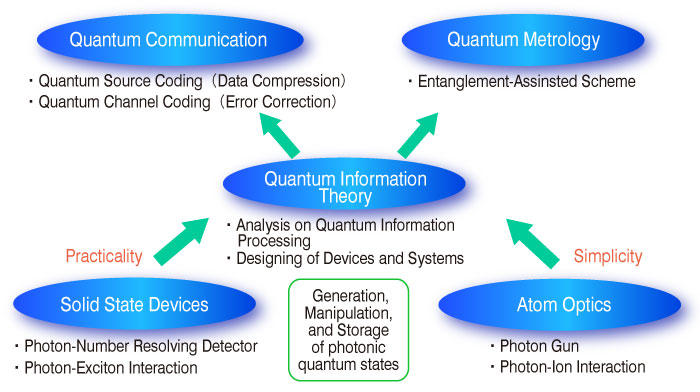In digital information systems, which are the basis of our present information technologies, 0 is always and forever 0, and 1 is always and forever 1 unless they are changed from outside. However, in the world of atomic scale, a signal that can be 0 and 1 simultaneously can be created. At the end of the 20th Century, tools were developed for directly controlling phenomena on an atomic scale. For example, a state can be created in which two molecules are shared between two parities over several tens of kilometers apart. Quantum mechanical phenomena that appeared paradoxical, are now being directly proved in experiments. Such phenomena of quantum mechanics are now applicable to new information technologies, which are incomparable with conventional technologies. Quantum mechanics is now closely related to the central concepts of information.
We aim to developing theories for processing signals at the quantum level that can be in 0 and 1 simultaneously, and also to developing technologies of implementing theoretical predictions in quantum optical domain.
Home > About NICT > Organization > Advanced ICT Research Institute > Quantum ICT Advanced Development Center > Overview
Our studies have mainly two directions: investigation of the basic principles of communication and development of new metrology. Quantum information theory serves as our guidelines. We are to develop theories to quantify information protocols allowed in quantum mechanics, elucidate their performance limits, and design practical devices.
However, we currently have very little technologies for studying quantum info-communications, and innovative technologies need to be developed. Two approaches are now taken. The first approach is to investigate quantum information processing using atomic optical systems. These systems provide us with the simplest and cleanest system for the verification of theories.
The second approach is in terms of practice, that is, new solid state devices should be developed. Development of the photon-number-resolving detector is an urgent topic. We are also investigating the basic physical processes aiming at controlling the quantum states of light. Experimental studies are especially being conducted on the coherent interactions between light and excitons, which are charged excitations formed on semi-conductive quantum dots.








